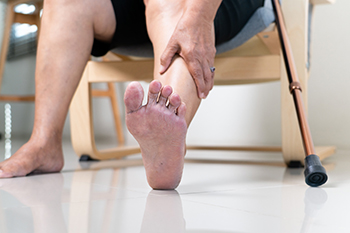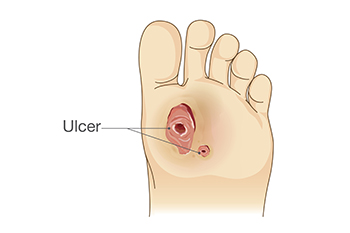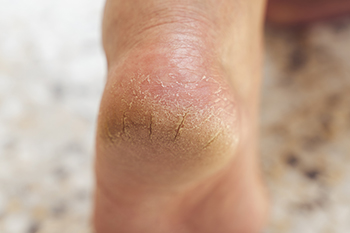Items filtered by date: March 2024
Foot Pain in Older People

Foot pain in older people is often a result of various factors, including structural disorders like corns, calluses, nail disorders, bunions, and hammertoes. In addition, foot pain in older adults may be caused by systemic conditions such as osteoarthritis, rheumatoid arthritis, gout, and diabetes. This pain can significantly restrict mobility, inhibit daily activities, affect balance, and diminish overall quality of life. Seeking help from a podiatrist is essential for dealing with the many types of foot pain brought on by the aging process. Podiatrists specialize in addressing foot and ankle problems, offering expertise in assessing, diagnosing, and treating conditions specific to the feet. With their guidance, older individuals can receive personalized care aimed at relieving pain, improving mobility, and improving well-being. For help with foot pain, it is suggested that you make an appointment with a podiatrist.
Proper foot care is something many older adults forget to consider. If you have any concerns about your feet and ankles, contact Gary J. Kaiserman, DPM from Achilles Footcare Center. Our doctor can provide the care you need to keep you pain-free and on your feet.
The Elderly and Their Feet
As we age we start to notice many changes in our body, but the elder population may not notice them right away. Medical conditions may prevent the elderly to take notice of their foot health right away. Poor vision is a lead contributor to not taking action for the elderly.
Common Conditions
- Neuropathy – can reduce feeling in the feet and can hide many life-threatening medical conditions.
- Reduced flexibility – prevents the ability of proper toenail trimming, and foot cleaning. If left untreated, it may lead to further medical issues.
- Foot sores – amongst the older population can be serious before they are discovered. Some of the problematic conditions they may face are:
- Gouging toenails affecting nearby toe
- Shoes that don’t fit properly
- Pressure sores
- Loss of circulation in legs & feet
- Edema & swelling of feet and ankles
Susceptible Infections
Diabetes and poor circulation can cause general loss of sensitivity over the years, turning a simple cut into a serious issue.
If you have any questions please feel free to contact our offices located in Forest Lane and West Kiest Boulevard Dallas, TX . We offer the newest diagnostic and treatment technologies for all your foot and ankle needs.
Staying Abreast of Diabetic Foot Ulcer Treatments

Staying informed about diabetic foot ulcer treatments is necessary for effective patient care. Common interventions include surgical debridement to remove necrotic tissue, antibiotic therapy to combat infection, and vascular assessment to optimize blood flow. Offloading pressure from affected areas is essential for healing. In severe cases, amputation may be necessary to prevent further complications. Additionally, various therapies exist for non-healing wounds, such as advanced dressing. Podiatrists play a vital role in diabetic foot ulcer management, possessing specialized education and skills in this field. By staying abreast of evolving treatments and leveraging multidisciplinary approaches, they can enhance outcomes and improve the quality of life for individuals with diabetic foot ulcers. If you suffer from diabetic foot ulcers, it is strongly suggested that you make routine appointments with a podiatrist for the best care possible.
Wound care is an important part in dealing with diabetes. If you have diabetes and a foot wound or would like more information about wound care for diabetics, consult with Gary J. Kaiserman, DPM from Achilles Footcare Center. Our doctor will assess your condition and provide you with quality foot and ankle treatment.
What Is Wound Care?
Wound care is the practice of taking proper care of a wound. This can range from the smallest to the largest of wounds. While everyone can benefit from proper wound care, it is much more important for diabetics. Diabetics often suffer from poor blood circulation which causes wounds to heal much slower than they would in a non-diabetic.
What Is the Importance of Wound Care?
While it may not seem apparent with small ulcers on the foot, for diabetics, any size ulcer can become infected. Diabetics often also suffer from neuropathy, or nerve loss. This means they might not even feel when they have an ulcer on their foot. If the wound becomes severely infected, amputation may be necessary. Therefore, it is of the upmost importance to properly care for any and all foot wounds.
How to Care for Wounds
The best way to care for foot wounds is to prevent them. For diabetics, this means daily inspections of the feet for any signs of abnormalities or ulcers. It is also recommended to see a podiatrist several times a year for a foot inspection. If you do have an ulcer, run the wound under water to clear dirt from the wound; then apply antibiotic ointment to the wound and cover with a bandage. Bandages should be changed daily and keeping pressure off the wound is smart. It is advised to see a podiatrist, who can keep an eye on it.
If you have any questions, please feel free to contact our offices located in Forest Lane and West Kiest Boulevard Dallas, TX . We offer the newest diagnostic and treatment technologies for all your foot care needs.
Are Bunions Affecting Your Everyday Life?
Education Requirements for Podiatrists

Becoming a podiatrist involves rigorous educational pursuits to equip individuals with the knowledge and skills necessary for foot and ankle care. Aspiring podiatrists typically embark on a journey that includes undergraduate studies, followed by enrollment in a Doctor of Podiatric Medicine, or DPM program, accredited by the Council on Podiatric Medical Education, abbreviated CPME. These programs, spanning four years, encompass coursework in anatomy, physiology, pharmacology, and podiatric medicine, supplemented by clinical rotations and hands-on training in podiatric clinics and hospitals. Upon completing the DPM program, aspiring podiatrists undertake postgraduate training through residency programs, where they gain specialized experience in podiatric surgery, wound care, sports medicine, and other facets of foot and ankle care. Obtaining state licensure requires successful completion of national and state board examinations, ensuring competency and adherence to professional standards. Continuous education and professional development are integral to the practice of podiatry, as practitioners stay abreast of advancements and best practices to deliver quality care to their patients. If you are interested in pursuing the field of podiatry, it is suggested that you speak to this type of doctor who can answer any questions or address any concerns you may have.
If you are dealing with pain in your feet and ankles, you may want to seek help from a podiatrist. Feel free to contact Gary J. Kaiserman, DPM from Achilles Footcare Center. Our doctor can provide the care you need to keep you pain-free and on your feet.
What Is a Podiatrist?
A podiatrist is a doctor of podiatric medicine who diagnoses and treats conditions of the foot, ankle, and related structures of the leg. Your podiatrist may specialize in a certain field such as sports medicine, wound care, pediatrics, and diabetic care. Podiatrists have the ability to become board certified through training, clinical experience, and then taking an exam.
What Do Podiatrists Do?
On a daily basis, a podiatrist may perform the following activities:
- Diagnose foot ailments such as ulcers, tumors, fractures, etc.
- Use innovative methods to treat conditions
- Use corrective orthotics, casts, and strappings to correct deformities
- Correct walking patterns and balance
- Provide individual consultations to patients
It is very important that you take care of your feet. It’s easy to take having healthy feet for granted, however foot problems tend to be among the most common health conditions. Podiatrists can help diagnose and treat a variety of feet related conditions, so it is crucial that you visit one if you need assistance.
If you have any questions please feel free to contact our offices located in Forest Lane and West Kiest Boulevard Dallas, TX . We offer the newest diagnostic and treatment technologies for all your foot and ankle needs.
Risks Posed by Cracked Heels
 Leaving cracked heels untreated poses several risks that can affect your health. When the skin on the heels becomes excessively dry and develops calluses, it leads to deep fissures or cracks. These openings increase the risk of foot infections and leave an entry point for bacteria. Cracked heels can also lead to pain, discomfort, and difficulty walking, which may interfere with day-to-day activities. In severe cases, untreated cracked heels may result in bleeding and increase the risk of cellulitis, a serious bacterial skin infection. Foot wounds may develop when cracked heels become infected, and this is especially important to avoid for people with diabetes and the associated loss of circulation in the feet. Cracked heels may also signal underlying health issues, such as vitamin deficiencies or thyroid disorders. If you have cracked heels, it is suggested you make an appointment with a podiatrist who can treat the issue and prevent complications.
Leaving cracked heels untreated poses several risks that can affect your health. When the skin on the heels becomes excessively dry and develops calluses, it leads to deep fissures or cracks. These openings increase the risk of foot infections and leave an entry point for bacteria. Cracked heels can also lead to pain, discomfort, and difficulty walking, which may interfere with day-to-day activities. In severe cases, untreated cracked heels may result in bleeding and increase the risk of cellulitis, a serious bacterial skin infection. Foot wounds may develop when cracked heels become infected, and this is especially important to avoid for people with diabetes and the associated loss of circulation in the feet. Cracked heels may also signal underlying health issues, such as vitamin deficiencies or thyroid disorders. If you have cracked heels, it is suggested you make an appointment with a podiatrist who can treat the issue and prevent complications.
If the skin on your feet starts to crack, you may want to see a podiatrist to find treatment. If you have any concerns, contact Gary J. Kaiserman, DPM from Achilles Footcare Center. Our doctor can provide the care you need to keep you pain-free and on your feet.
Cracked Heels
It is important to moisturize your cracked heels in order to prevent pain, bleeding, and infection. The reason cracked heels form is because the skin on the foot is too dry to support the immense pressure placed on them. When the foot expands, the dry skin on the foot begins to split.
Ways to Help Heal Them
- Invest in a good foot cream
- Try Using Petroleum Jelly
- Ease up on Soaps
- Drink Plenty of Water
Ways to Prevent Cracked Heels
- Moisturize After Showering
- Skip a Shower
- Keep Shower Water Lukewarm
- Don’t Scrub Your Feet
If you are unsure how to proceed in treating cracked heels, seek guidance from a podiatrist. Your doctor will help you with any questions or information you may need.
If you have any questions, please feel free to contact our offices located in Forest Lane and West Kiest Boulevard Dallas, TX . We offer the newest diagnostic and treatment technologies for all your foot care needs.

